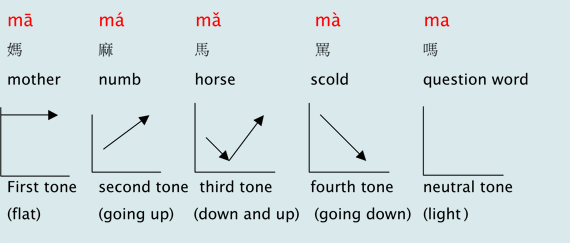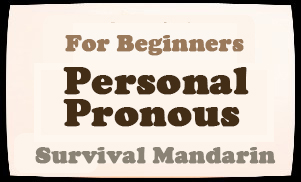Interested in learning Mandarin Chinese? You’re not alone. Mandarin is one of the most popular languages for business, travel, and pleasure.Learning to speak Chinese isn’t rocket science. There are some things you can do to make it painless or nearly so.
Many people think that learning Mandarin Chinese is difficult. There is no doubt that it is definitely challenging to learn Chinese characters that can take years to master. Learning to speak Mandarin Chinese, however, is fairly simple because there are none of the verb conjugations that are found in many Western languages.
Tonal Language
Mandarin Chinese is a tonal language, which means that the pitch of a syllable can change its meaning. There are four tones in spoken Mandarin: high; rising; falling and rising; and falling.
 These kinds of tones are also used in English for emphasis or inflection, but Mandarin tones are entirely different. The tones are the most difficult part of spoken Mandarin, but once the concept is absorbed, Mandarin vocabulary and grammar is surprisingly easy.
Mandarin has four distinct tones which are used to clarify the meaning of words. Proper use of the tones is essential for speaking and understanding the language.
Tones should be practiced right from the beginning of your Mandarin study. When learning new vocabulary you must memorize the proper tone, otherwise the word is only half-learned.
Pinyin
Most people hold back learning Chinese characters until they have at least a basic understanding of the spoken langauge. Fortunately, there is an alter
These kinds of tones are also used in English for emphasis or inflection, but Mandarin tones are entirely different. The tones are the most difficult part of spoken Mandarin, but once the concept is absorbed, Mandarin vocabulary and grammar is surprisingly easy.
Mandarin has four distinct tones which are used to clarify the meaning of words. Proper use of the tones is essential for speaking and understanding the language.
Tones should be practiced right from the beginning of your Mandarin study. When learning new vocabulary you must memorize the proper tone, otherwise the word is only half-learned.
Pinyin
Most people hold back learning Chinese characters until they have at least a basic understanding of the spoken langauge. Fortunately, there is an alter native way of reading and writing Mandarin that is based on the Western (Roman) alphabet – Romanization.
Romanization transposes the sounds of spoken Chinese into the Roman alphabet so that learners can read and write the language. There are several systems of Romanization, but the most popular is Pinyin.
]]>
native way of reading and writing Mandarin that is based on the Western (Roman) alphabet – Romanization.
Romanization transposes the sounds of spoken Chinese into the Roman alphabet so that learners can read and write the language. There are several systems of Romanization, but the most popular is Pinyin.
]]>
 Your First Words!
This lesson you will learn personal pronouns.
Your First Words!
This lesson you will learn personal pronouns.





 Some example sentences with adjectives colour coded in turquoise (as they are modifiers just like adverbials):
Some example sentences with adjectives colour coded in turquoise (as they are modifiers just like adverbials):

 These kinds of tones are also used in English for emphasis or inflection, but Mandarin tones are entirely different. The tones are the most difficult part of spoken Mandarin, but once the concept is absorbed, Mandarin vocabulary and grammar is surprisingly easy.
Mandarin has four distinct tones which are used to clarify the meaning of words. Proper use of the tones is essential for speaking and understanding the language.
Tones should be practiced right from the beginning of your Mandarin study. When learning new vocabulary you must memorize the proper tone, otherwise the word is only half-learned.
Pinyin
Most people hold back learning Chinese characters until they have at least a basic understanding of the spoken langauge. Fortunately, there is an alter
These kinds of tones are also used in English for emphasis or inflection, but Mandarin tones are entirely different. The tones are the most difficult part of spoken Mandarin, but once the concept is absorbed, Mandarin vocabulary and grammar is surprisingly easy.
Mandarin has four distinct tones which are used to clarify the meaning of words. Proper use of the tones is essential for speaking and understanding the language.
Tones should be practiced right from the beginning of your Mandarin study. When learning new vocabulary you must memorize the proper tone, otherwise the word is only half-learned.
Pinyin
Most people hold back learning Chinese characters until they have at least a basic understanding of the spoken langauge. Fortunately, there is an alter native way of reading and writing Mandarin that is based on the Western (Roman) alphabet – Romanization.
Romanization transposes the sounds of spoken Chinese into the Roman alphabet so that learners can read and write the language. There are several systems of Romanization, but the most popular is Pinyin.
]]>
native way of reading and writing Mandarin that is based on the Western (Roman) alphabet – Romanization.
Romanization transposes the sounds of spoken Chinese into the Roman alphabet so that learners can read and write the language. There are several systems of Romanization, but the most popular is Pinyin.
]]>